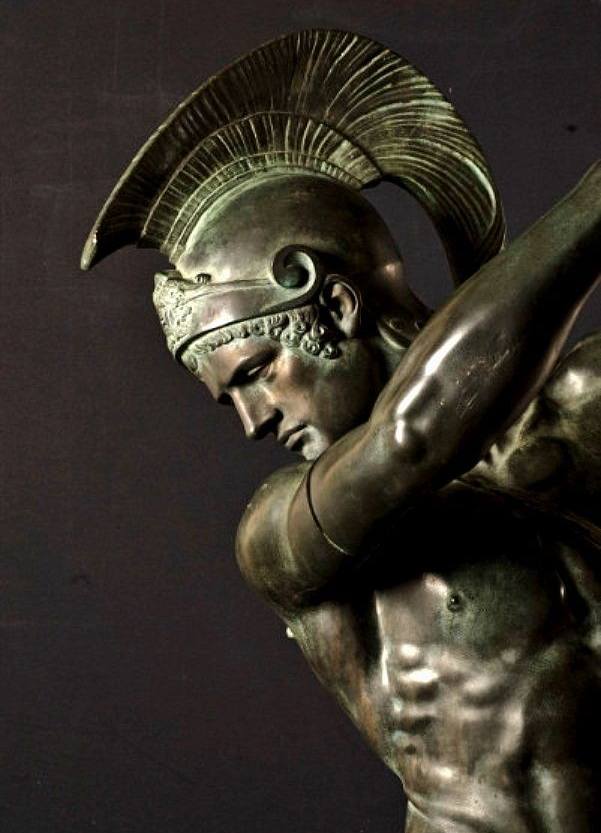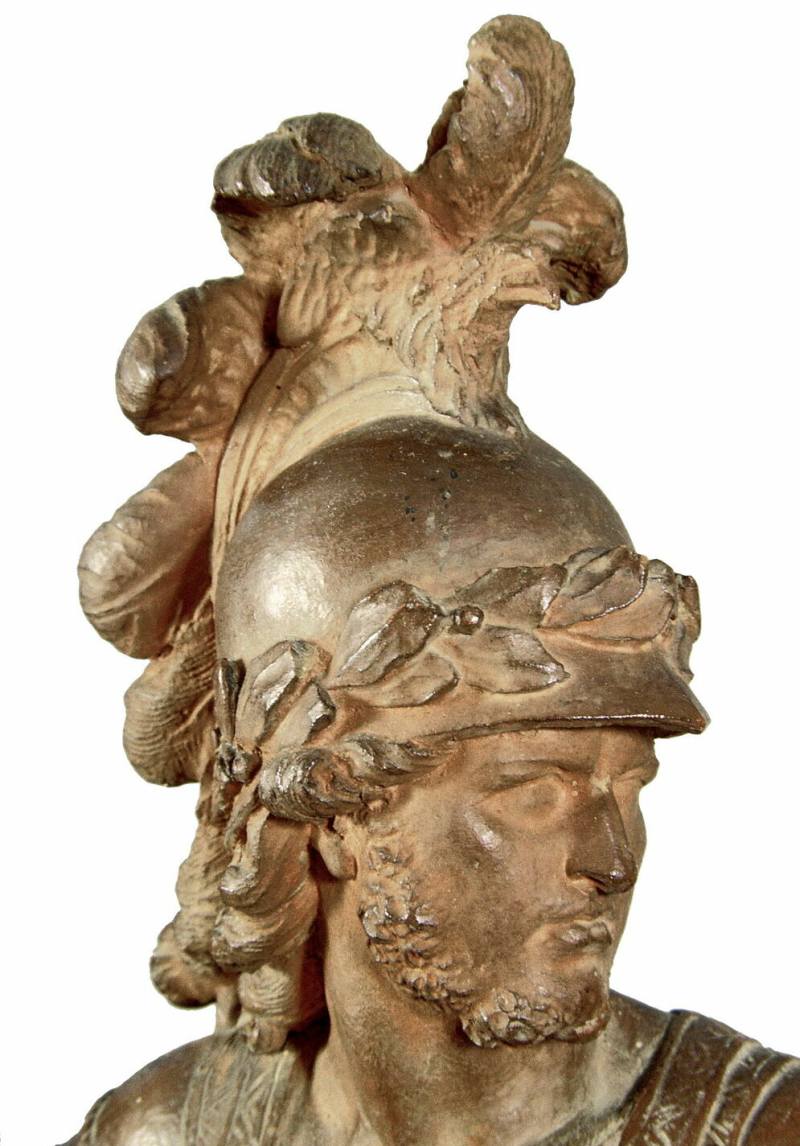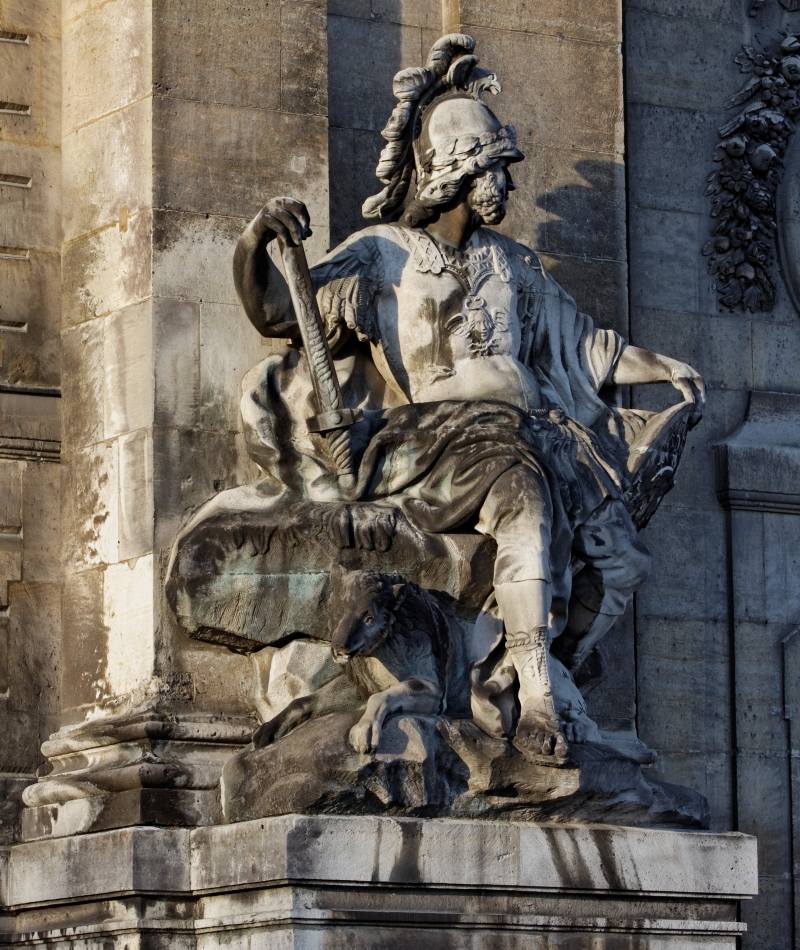Nuevo capítulo en dos partes (la primera aquí) de esta serie dedicada a la pintura de estatuas, tallas, piezas y grupos escultóricos, reales o imaginados por los artistas. Acompaño cada trabajo, cuando es posible, con la obra original o referencias para ubicarla.
Este artículo se centra en las obras del artista polaco Daniel Pawłowski.
New chapter in two parts (the first one here) of this series dedicated to the painting of statues, carvings, pieces and sculptural groups, real or imagined by the artists. I accompany each one, when possible, with the original work or references to locate it.
This article focuses in the works by the Polish artist Daniel Pawłowski.
__________________________________________________
Daniel Pawłowski
(Włocławek, Polonia / Poland, 1989-)
Daniel Pawłowski trabajando / at work
Daniel Pawlowski es un artista polaco nacido en 1989 en Włocławek, donde vive y trabaja.
Más información en la Parte 1.
"Victoria Anima", óleo sobre lienzo / oil on canvas, 73 x 92 cm.
John Angel
(Newton Abbot, Devon, Inglaterra / England, 1881 - 1960)
"Memorial de guerra de Exeter / Exeter War Memorial"
Jardines de Northernway / Northernhay Gardens (Exeter, Inglaterra / England)
Vista dede una de las puertas de la muralla / Seen from a gateway in the city wall
Inaugurado / unveiled, 1923. Foto / Photo: Smalljim. Wikimedia Commons
"Memorial de guerra de Exeter / Exeter War Memorial"
Detalle de las figuras de la Victoria y el dragón / Detail of the figure of Victory and the dragon
Foto / Photo: Simon Waters. Wikimedia Commons
Quarried from Blackingstone Quarry, near Moretonhampstead, and erected by Messrs. Easton & Son of Exeter, it is a total of 31 ft high, with a 20 ft high pedestal. The figure representing Victory, 8 ft (2.4 m) tall, is said to hold "aloft a spray of laurels in token of gratitude to Heaven. Boldly modelled, and with considerable action, this figure, standing on a dragon, forms an interesting silhouette from all sides." On each of the four arms of the cross is a bronze figure representing the war, including a soldier, a sailor on the hull of a ship, a prisoner of war, and a V.A.D. nurse in uniform holding a bandage. The figures would each be 7 ft 4 in in height if they were standing. Wikipedia
John Angel en "El Hurgador" / in this blog: [Aniversarios (VII)]
_______________________________________________________________
Daniel Pawłowski
"Na granicy... / En la frontera... / On The Border...", óleo sobre lienzo / oil on canvas, 60 x 80 cm.
"Na granicy... / En la frontera... / On The Border..." (detalle / detail)
Eugène-Louis Lequesne (o / or Le Quesne)
(París, Francia / France, 1815 - 1887)
"La Renommée retenant Pégase / La Fama reteniendo a Pegaso / Fame Holding Pegasus"
Bronce / bronze, esquina suroeste, gran frontón del escenario /
Southwest corner, large gable of the stage. Palais Garnier (París, Francia / France).
Foto / Photo: Jastrow. Wikimedia Commons
Los bocetos de yeso se exponen en el Museo de Orsay / Plaster sketches are exhibited at the Orsay Museum
Eugène-Louis Lequesne (o Le Quesne) fue un escultor francés.
En 1841 ingresó en la École nationale des beaux-arts, en el taller de James Pradier. En 1843 ganó el segundo premio de Roma, y en 1844 el primer premio, con un bajorrelieve en yeso titulado "Pyrrhus tuant Priam". Vivió en la Académie de France en Roma (Villa Médici) de 1844 a 1849, junto a Jean-Louis Charles Garnier. En 1855 recibió el Gran Premio de escultura de la Exposición Universal y la Legión de Honor.
"La Renommée retenant Pégase / La Fama reteniendo a Pegaso / Fame Holding Pegasus"
Foto / Photo: Mossot. Wikimedia Commons
Eugène-Louis Lequesne (or Le Quesne) was a French sculptor.
In 1841, he entered the École nationale des beaux-arts, in James Pradier's workshop. In 1843, he won the second Prix de Rome, and in 1844 the first prize, with a plaster bas-relief entitled Pyrrhus tuant Priam. He lived at the Académie de France at Rome (Villa Médici) from 1844 to 1849, alongside Jean-Louis Charles Garnier. In 1855, he was awarded the Great Prize for sculpture at the Exposition Universelle, and received the Légion d'honneur.
Louis-Léon Cugnot
(Île-de-France, París, Francia / France, 1835 - 1894)
"Corybante étouffant les cris de Jupiter enfant / Corybante ahogando los gritos de Júpiter niño /
Corybante Stifling the Cries of Jupiter"
Bronce / bronze, 1887. Foto / Photo: Michaël Martin. Flickr
Musée de Picardie (Amiens, Francia / France)
"Corybante étouffant... / Corybante ahogando... / Corybante Stifling..." (detalle / detail). Pinterest
La obra en su ubicación original en los Jardines de las Tullerías /
The artwork in its original location in the Tuileries Gardens (París, Francia / France)
Fotos / Photos: Documentation du musée d'Orsay, dossier RF 220 ; 1875,
photographie Michelez au Salon, f° 27. Archives nationales : AJ/52/201 ; F/21/130 ; F/21/207
La pieza original de mármol fue presentada en Salón de 1863, donde obtuvo una medalla de tercera clase.
En 1877 la estatua fue adquirida por el Estado, y erigida en los Jardines de las Tullerías, en lugar de la de Diana.
En febrero de 1981 la escultura cayó rompiéndose. La cabeza de Corbyante fue robada y la de Júpiter dañada. Las piezas se llevaron al taller de mármol del Louvre. Algunos fragmentos fueron destinados al futuro museo de Orsay para su almacenamiento.
"Etude de Corybante étouffant les cris de Jupiter enfant / Estudio de Corybante ahogando los gritos de Júpiter niño /
Study of Corybante Stifling the Cries of Jupiter"
Según / after Louis Léon-Cugnot
Bronce / bronze, altura / height: 90,5 cm. MutualArt
The original marble piece was presented at the 1863 Salon, where it won a third class medal.
In 1877 the statue was acquired by the State, and erected in the Tuileries Gardens, in place of the statue of Diana.
In February 1981 the sculpture fell and broke. The head of Corbyante was stolen and that of Jupiter damaged. The pieces were taken to the marble workshop of the Louvre. Fragments were destined to the future Musée d'Orsay for storage.
"Etude de Corybante... / Estudio de Corybante... / Study of Corybante..." (detalle / detail). MutualArt
"Etude de Corybante... / Estudio de Corybante... / Study of Corybante..." (detalle / detail). MutualArt
Louis Léon-Cugnot en "El Hurgador" / in this blog: [Aniversarios (XXXIX)]
_________________________________________________________________
Daniel Pawłowski
"Fides-Obietnica... / Promesa / Promise", óleo sobre lienzo / oil on canvas, 60 x 80 cm.
Daniel Pawlowski is a Polish artist born in 1989 in Włocławek, where he lives and works.
More information in Part 1.
Guillaume Coustou el Viejo / The Elder
(Lyon, Francia / France, 1677 - París, 1746)
"Marte / Mars", terracota, 39,5 x 30,5 x 18 cm., c.1733-34 (detalle / detail)
Musée du Louvre (París, Francia / France)
Pequeño modelo preparatorio para una de las estatuas de piedra que decoraban el gran portal que daba a la explanada de la fachada del Hôtel des Invalides de París. Citado en una memoria del artista en 1734 con su homólogo Minerva, por 1000 libras. Permaneció en el taller del escultor y luego con los descendientes de éste. Louvre
"Marte / Mars"
Small preparatory model for one of the stone statues that decorated the large portal overlooking the esplanade of the façade of the Hôtel des Invalides in Paris. Quoted in a memoir of the artist in 1734 with its counterpart Minerva, for 1000 livres. Remained in the workshop of the sculptor then in the descendants of the sculptor. Louvre
"Marte / Mars" (detalle, cabeza / detail, head)
"Hôtel des Invalides / Hotel de los Inválidos"
Fachada norte / North façade (París, Francia / France). Foto / Photo: Thesupermat. Wikimedia Commons
Las estatuas originales de Marte y Minerva que flanquean la entrada de la fachada norte del Hotel de los Inválidos fueron esculpidas por Guillaume Coustou entre 1732 y 1733. Sin embargo las que pueden verse en la actualidad son réplicas con las que reemplazaron las originales a principios de la década de 1960, debido a la intensa degradación que habían sufrido con el paso del tiempo.
"Marte / Mars". Hôtel des Invalides, fachada norte / north façade (París, Francia / France)
Foto / Photo: Thesupermat. Wikimedia Commons
The original statues of Mars and Minerva flanking the entrance of the north facade of the Hotel des Invalides were sculpted by Guillaume Coustou between 1732 and 1733. However, the ones that can be seen today are replicas that replaced the originals in the early 1960s, due to the intense degradation they had suffered over time.
Guillaume Coustou el Viejo en "El Hurgador" / The Elder in this blog:
___________________________________________________________
Daniel Pawłowski
"Krocząc w nieznane... / Caminando hacia lo desconocido... / Walking Into the Unknown..."
óleo sobre lienzo / oil on canvas, 80 x 60 cm.
Lambert-Sigisbert Adam
(Nancy, Francia / France, 1700 - París, 1759)
"Busto de Neptuno / Bust of Neptune"
Barro sobre zócalo de mármol / earthenware on marble socle, 81.28 × 63.5 × 40.64 cm., 1725-27
Los Angeles County Museum of Art (California, EE.UU./ CA, USA)
Lambert Sigisbert Adam en "El Hurgador" / in this blog: [Aniversarios (XXXVIII)]
___________________________________________________________
Daniel Pawłowski
"Sacramentum... / Sacramento... / Sacrament...", óleo sobre lienzo / oil on canvas, 50 x 50 cm.
"Ángel / Angel". Bóveda de Francisco Gómez / Francisco Gómez Vault
Cementerio de La Recoleta / Recoleta Cemetery (Buenos Aires, Argentina)
Imágenes de las obras de Daniel publicadas con autorización del artista (¡Muchas gracias, Daniel!)
Images of Daniel's works published here with artist's permission (Thanks a lot, Daniel!)
________________________________________________
Todos los posts de esta serie / All posts in this Series:


























No hay comentarios:
Publicar un comentario